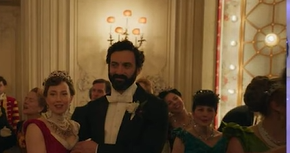“Clash in the Therapy Room: Florian Sparks a Volatile Fight on ‘90 Day Fiance: The Last Resort’”
The sanctity of therapy is supposed to be a place of healing, understanding, and growth—yet for Florian, that space felt like an arena, where frustration, stubbornness, and deep-seated conflicts erupted into chaos. On 90 Day Fiance: The Last Resort, viewers watched as an emotional powder keg ignited, revealing the raw, unfiltered side of a man unwilling to confront his issues and a partner desperate for change. The scene was tense, charged with a mixture of anger and helplessness, encapsulating the ongoing struggles that have defined their volatile relationship. Florian, unmistakably resistant, faced off against the therapists whose job was to mediate, but instead found themselves caught in the storm of his defiance.
From the moment the session began, it became painfully apparent that Florian’s stance on therapy was a barrier. The therapist explained the importance of the process, emphasizing the importance of balancing roles within their relationship. “Florian needs to step up,” the therapist said, pointing out the power imbalance, where Stacy appeared to be acting more like a parent than a partner. This was a revelation for viewers—highlighting a dynamic where Florian refused to accept responsibility, instead often falling into a childlike, oppositional role. The therapist made a pointed observation: Florian was not engaging in the therapy, and his resistance was creating a wall that seemed impossible to breach.
The situation escalated when language and respect were thrown into the mix, revealing the raw truth behind Florian’s frustrations. At one point, he yelled, “No, no, no. Stay far away,” as if warding off the reality of his own shortcomings. His outburst was accompanied by interruptions, dismissive gestures, and a chaotic scene where the therapist tried desperately to redirect the conversation. “Enough! Have some respect for them,” Stacy’s voice pleaded, but Florian’s attitude suggested he viewed her as an obstacle rather than a partner seeking help. The tension was palpable—an emotional eruption that exposed how deeply resistant he was to the entire process and perhaps, to the idea of change itself.
Amidst the chaos, more troubling accusations surfaced. The therapist, attempting to straighten the situation, described the relationship dynamic as “flip-flopping roles,” where one acts as the parent and the other as the child—a pattern that underpins much of their conflict. In a moment of raw honesty, the therapist called Florian a “sadistic narcissist,” a label that floored viewers and underscored the severity of their issues. Florian’s blatant disrespect and dismissiveness led to an unavoidable conclusion: the session was spiraling into hopelessness. His inability—or unwillingness—to accept guidance left the therapists feeling frustrated, exhausted, and powerless against his defiant attitude.
By the end of the confrontation, the scene left viewers questioning whether any real progress was possible. Florian’s refusal to engage or show respect turned a potentially pivotal healing moment into a disastrous showdown. The frustration was palpable—not just from the therapists but also from Stacy, who was caught in the middle of her partner’s outburst. The scene was a stark reminder that sometimes, despite the best intentions, hope for change can be overshadowed by stubbornness and refusal to accept help. As the camera faded out, one thing remained clear: this intense clash was just the tip of the iceberg in a relationship desperately in need of genuine understanding—and perhaps, a long, painful journey to find it.





